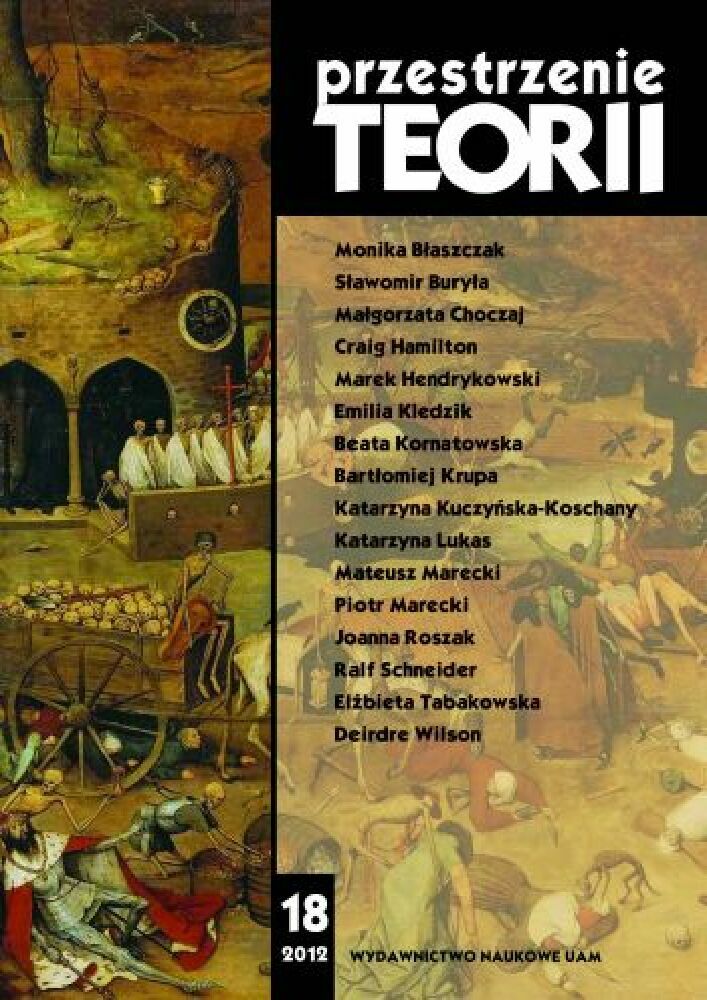Abstrakt
In this essay, we review the work of Wolfgang Iser, the major proponent of reception theory, and Mark Turner, the major proponent of cognitive criticism. The two theoretical lines advocated by Iser and Turner focus on the cognitive processes involved with reading literary texts. Unfortunately, bibliographic blind spots in both lines lead to the assumption that there is little overlap between reception theory and cognitive criticism. We put this assumption to rest by comparing and contrasting works by Iser and Turner in detail, starting with Iser’s work in the mid-1970s and ending with Turner’s work in the late 1990s.Bibliografia
E. Semino i J. Culpepper (ed.), Cognitive stylistics, Amsterdam 2002.
R. Tsur, Toward a theory of cognitive poetics, Amsterdam 1992; P. Stockwell, Cognitive poetics. An introduction, London 2002; J. Gavins i G. Steen (ed.), Cognitive poetics in practice, London 2003.
A. Richardson i M.T. Crane, Literary studies and cognitive science: toward a new interdisciplinarity, „Mosaic” 1999, 32/2, s. 123-140.
F. Steen i A. Richardson (ed.), Literature and the cognitive revolution (wydanie specjalne), „Poetics Today” 2002, 23/1.
T. Wright, Reader-response under review: an art, a game, or a science? „Style” 1995, 29, s. 530.
S. Gross, Cognitive readings; or, the dissapearance of literature in the mind: reviewing reading minds by Mark Turner, „Poetics Today” 1997, 18, s. 271-297.
D. Herman, Parables of narrative imagining: a review of the literary mind by Mark Turner, „Diacritics” 1999, 29, s. 20-36; T. Jackson, Questioning interdisciplinarity: cognitive
science, evolutionary psychology, and literary criticism, „Poetics Today” 2000, 21, s. 319-347.
S. Fish, Why no one is afraid of Wolfgang Iser: a review of The act of reading by Wolfgang Iser, „Diacritics” 1981, 11, s. 12-13.
R. Cohen (ed.), The writings of Wolfgang Iser (wydanie specjalne), „New Literary History” 2000, 31/1.
.R. Jauss, Toward an aesthetic of reception, tłum. T. Bahti, Minneapolis 1982.
J. Machor i P. Goldstein (ed.), Reception study: from literary theory to cultural studies, London 2001.
W. Iser, The act of reading: a theory of aesthetic response, Baltimore 1978, s. 96.
J. Culler, Structuralist poetics, New York 1975, s. 114.
N. Holland, Five readers reading, New Haven 1975.
N. Holland, Prospecting from reader response to literary anthropology, Baltimore 1989, s. 14.
W.C. Dimock, Forum: reply to Ellen Spolsky, „PMLA” 1999, 114, s. 222-223.
R. Tsur, Event Structure, Metaphor, and Reductionism, 1997, esej dostępny na: <http://www.tau.ac.il/~tsurxx/Emily_Dickinson.html> [dostęp: 09.04.2002].
D. Dennett, The intentional stance, Cambridge 1987.
N. Holland, Where is a text? A neurological view, „New Literary History” 2002, 33, s. 21-38.
W. Iser, The fictive and the imaginary: charting literary anthropology, Baltimore 1993, s. x.
H. Porter Abbot (ed.), On the origin of fiction: interdisciplinary perspectives (wydanie specjalne), „Substance” 2001, 30/1-2
M. Turner, Death is the mother of beauty: mind, metaphor, criticism, Chicago 1987, s. 3-4.
M. Turner, Reading minds: the study of English in the age of cognitive science, Princeton 1991, s. 6, 19, 22.
G. Fauconnier i M. Turner, The way we think, New York 2002.
Richardson, Brains, minds, and texts: a review of Mark Turner’s The literary mind, „Review” 1998, 20, s. 41.
G. Lakoff i M. Turner, More than cool reason: a field guide to poetic metaphor, Chicago 1989, s. 109.
J. Carroll, Literary study and evolutionary theory: a review essay, „Human Nature” 1998, 9, s. 273-292; F. Steen, „It’s for pretend: toward a communicational theory of entertainment”, wykład na UCLA z dnia 19.12.1999 roku; R. Storey, Mimesis and the human animal, Chicago 1995.
R. Gerrig, Experiencing narrative worlds: on the psychological activities of reading, New Haven 1993; D. Miall, Anticipation and feeling in literary response: a neuropsychological perspective, „Poetics” 1995, 22, s. 275-98.
D. Miall i D. Kuiken, Foregrounding: defamiliarization, and affect: response to literary stories, „Poetics” 1994, 22, s. 389-407.
H. van Oostendorp i R. Zwaan (ed.), Naturalistic text comprehension, Norwood 1994.
R. Zwaan, Aspects of literary comprehension, Amsterdam 1993.
Licencja
Autorzy
Autorzy tekstów przyjętych do publikacji w czasopiśmie „Przestrzeniach Teorii” są zobowiązani do wypełnienia, podpisania i odesłania na adres redakcji umowy o udzielenie nieodpłatnej licencji do utworów, z zobowiązaniem do udzielania sublicencji CC.
Zgodnie z umową, autorzy tekstów opublikowanych w czasopiśmie „Przestrzeniach Teorii” udzielają Uniwersytetowi im. Adama Mickiewicza w Poznaniu niewyłącznej i nieodpłatnej licencji oraz zezwalą na użycie sublicencji Creative Commons Attribution-NonCommercial-NoDerivatives 4.0 International (CC BY-NC-ND 4.0).
Autorzy zachowują prawa do dalszego, swobodnego rozporządzania utworem.
Autorzy, którzy wykorzystują w swoim tekście cudze utwory (np. ilustracje, fotografie) proszeni są o dostarczenie do redakcji czasopisma zgodę na publikację od uprawnionych podmiotów.
Użytkownicy
Zainteresowani użytkownicy internetu uprawnieni są do korzystania z utworów opublikowanych po 2015 roku „Przestrzeniach Teorii” tylko w calach niekomercyjnych, pod następującymi warunkami:
- uznanie autorstwa - obowiązek podania wraz z rozpowszechnionym utworem, informacji, o autorstwie, tytule, źródle (odnośniki do oryginalnego utworu, DOI) oraz samej licencji;
- bez tworzenia utworów zależnych - utwór musi być zachowany w oryginalnej postaci, nie można bez zgody twórcy rozpowszechniać np. tłumaczeń, opracowań.
Do wszystkich tekstów opublikowanych przed 2015 r. prawa autorskie są zastrzeżone.
Inne
Uniwersytet im. Adama Mickiewicza w Poznaniu zachowuje prawo do czasopisma jako całości (układ, forma graficzna, tytuł, projekt okładki, logo itp.).
